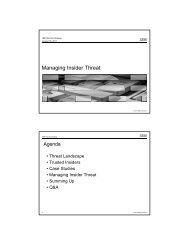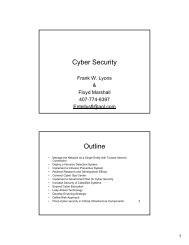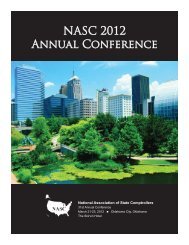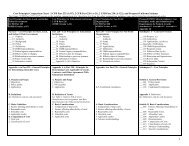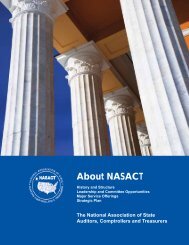Advisory Committee on Tax Exempt and Government Entities (ACT ...
Advisory Committee on Tax Exempt and Government Entities (ACT ...
Advisory Committee on Tax Exempt and Government Entities (ACT ...
You also want an ePaper? Increase the reach of your titles
YUMPU automatically turns print PDFs into web optimized ePapers that Google loves.
<strong>Government</strong>al Relati<strong>on</strong>ship <strong>and</strong> Communicati<strong>on</strong> Between the Internal Revenue Service <strong>and</strong> Indian Tribal <strong>Government</strong>shas a c<strong>on</strong>sultati<strong>on</strong> policy applicable to the development of regulati<strong>on</strong>s. At our request,the Director of ITG provided us with a copy of Treasury’s c<strong>on</strong>sultati<strong>on</strong> policy, which weunderst<strong>and</strong> has not been made generally available to the public or to the Tribal<strong>Government</strong>s. The copy that we were provided, which is not dated, is attached asExhibit F. The Treasury Department policy was intended to implement both ExecutiveOrder 13132 regarding federalism <strong>and</strong> Executive Order 13175 regarding c<strong>on</strong>sultati<strong>on</strong>with Tribal <strong>Government</strong>s.With respect to Tribal <strong>Government</strong>s, the Treasury Department c<strong>on</strong>sultati<strong>on</strong> policy istriggered <strong>on</strong>ly by regulati<strong>on</strong>s projects “that have substantial direct effects <strong>on</strong> <strong>on</strong>e ormore Indian tribes, <strong>on</strong> the relati<strong>on</strong>ship between the Federal <strong>Government</strong> <strong>and</strong> Indiantribes, or <strong>on</strong> the distributi<strong>on</strong> of power <strong>and</strong> resp<strong>on</strong>sibilities between the Federal<strong>Government</strong> <strong>and</strong> Indian tribes,” <strong>and</strong> then <strong>on</strong>ly if the Treasury Department determinesthat c<strong>on</strong>sultati<strong>on</strong> is required. We underst<strong>and</strong> that the Treasury Department never hasdetermined that c<strong>on</strong>sultati<strong>on</strong> is required under this policy, including with respect to thedevelopment of “integral part” <strong>and</strong> Pensi<strong>on</strong> Protecti<strong>on</strong> Act regulati<strong>on</strong>s that weunderst<strong>and</strong> are currently under development <strong>and</strong> the development of regulati<strong>on</strong>sinterpreting the “essential governmental functi<strong>on</strong>” requirement of Secti<strong>on</strong> 7871 of theCode for the issuance of tax-exempt b<strong>on</strong>ds by Tribal <strong>Government</strong>s that recentlyresulted in the issuance of an advance notice of proposed rulemaking.We underst<strong>and</strong> that the IRS is currently working to gain the Treasury Department’sapproval of procedures that will allow the IRS to interact with Tribes <strong>on</strong> taxadministrati<strong>on</strong> matters in a manner c<strong>on</strong>sistent with Executive Order 13175. The IRShas stated that the Treasury Department will remain the Department specified forc<strong>on</strong>sultati<strong>on</strong> <strong>on</strong> regulatory matters.Although the IRS does not currently have a written c<strong>on</strong>sultati<strong>on</strong> policy, ITG holdsperiodic “listening” meetings with ITG representatives to provide Tribal representativesthe opportunity to raise questi<strong>on</strong>s <strong>and</strong> offer suggesti<strong>on</strong>s <strong>on</strong> methods to enhance federaltax administrati<strong>on</strong> affecting Tribes. Up to four such meetings are held each year invarious locati<strong>on</strong>s throughout the country. Meetings are announced <strong>on</strong> ITG’s website<strong>and</strong> in ITG’s regi<strong>on</strong>al newsletters. In additi<strong>on</strong>, the Tribes located in the area of eachmeeting receive a direct mailing to the Tribal leader. ITG does not circulate agendas forthese meetings, because ITG does not want to “taint” the process by pre-ordaining thesubject matter of the meetings. According to ITG, the primary purpose of the meetingsis to listen to the Tribes’ c<strong>on</strong>cerns about matters of federal tax administrati<strong>on</strong> <strong>and</strong> taxpolicy.In additi<strong>on</strong> to the listening meetings, ITG has notified Tribes <strong>on</strong> its website aboutopportunities for “issue-based c<strong>on</strong>sultati<strong>on</strong>.” Such c<strong>on</strong>sultati<strong>on</strong> may be invoked by arequest by e-mail to the Director of ITG by a Tribe or group of Tribes with respect to anyissue or IRS acti<strong>on</strong> that may impact, or is impacting such governments, or where aTribe desires to seek the input of the IRS <strong>on</strong> the potential federal tax c<strong>on</strong>sequences ofec<strong>on</strong>omic opportunities, local laws, agreements, or similar matters that may affect, or beof interest to, the Tribe.ADVISORY COMMITTEE ON TAX EXEMPT AND GOVERNMENT ENTITIES (<strong>ACT</strong>) June 11, 2008 11






